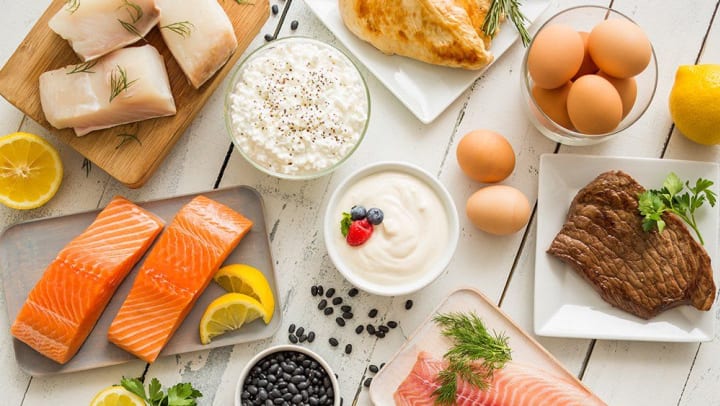Most of us have an innate understanding that protein intake is important to our health, and as we age, protein intake becomes more important. Understanding why (without making this a science class) is an excellent place to start so that we can learn how a good balance of protein intake in our daily diet makes us better able to lead a physically fulfilling and healthier life as we age.
For those of us that remember our health and hygiene classes, we know that every cell in the human body contains protein, which is made of amino acids. Leucine is an essential amino acid, and aging causes general amino acid sensitivity loss. That means we need more leucine to trigger muscle protein production. Loss of muscle mass as we age can lead to a condition called sarcopenia, which lowers stamina and increases risk of a variety of health problems.
Even the healthiest older adult needs more protein to generate muscle mass, but studies (click here) show that up to one-third of older adults don’t get enough. This can be due to a variety of factors, ranging from chronic conditions and tooth loss to tight budgets and reduced taste sensitivity, among others. But whether any or none of those challenges exists, we all need to get enough protein to maintain healthy muscle mass to stay active and healthy.
Types of Protein for older Adults: Animal proteins contain all nine of the essential amino acids our bodies need while plant proteins do not, but animal protein should still be a smaller part of daily protein. (As with all dietary matters, please consult with your physician). So, what types of protein mix are a good place to start for your daily intake? Animal foods like beef, pork, lamb, poultry, fish, eggs, milk and products made with milk contain higher amounts of leucine. It’s also found in high amounts within soybeans, nuts and seeds, and Greek Yogurt, among other foods that enable you to add protein to your daily diet across individual meals and snacks.
You don’t need a nutritionist to identify the variety of foods that are high in protein and recommended for older adults if you’re consulting with your regular healthcare provider. While they can provide guidance on how much and what type of protein you need each day, here are some scientifically proven and accepted figures to get you started.
Recommend Daily Protein Amounts: The scientific recommended daily allowance measures for everyone is to shoot for around 0.6 gram of protein per pound of body weight, which would be around 90 grams for a 150-pound person. This should be spread across three meals a day with about 25 to 30 grams per meal. Recent research shows that older Americans need more than that with an average of 1 to 1.3 grams of protein per kilogram of body weight per day, especially if they’re active. Just a few examples of how this works out with certain protein-rich food servings would be:
- 18 grams in 6-ounces of Greek yogurt
- 14 grams in a 1/2-cup of cottage cheese
- 28 grams in a 3-ounce of skinless chicken
- 8 grams in a cup of milk
It’s also important to spread protein consumption evenly throughout the day because our bodies are less efficient at processing protein as we grow older, so we need more. Reliable sources like Today’s Dietician Magazine have provided a list (click here) of common food protein contents.
Healthy Aging Through Balanced Nutrition: As always, general health, specific conditions, activity level, mobility, and the full mix of your diet are all playing a collective part in your health. For example, it’s important to consider all the other aspects that come with different proteins, such as fats, carbohydrates, vitamins, minerals, and other nutrients. Here again, your healthcare provider is the person to consult for reliable sources on balancing these aspects for your individual needs.
Getting the right amount of protein as you get older will not prevent muscle loss that is a natural part of aging to some degree, but it will slow it down considerably for most reasonably healthy older adults. As in all things about our health, the goal is to constantly work to maintain and improve our health so that we can enjoy what can be one of the best parts of our lives.


